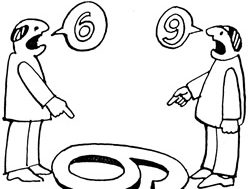Michelle Gibbings* cautions leaders against always selecting people for their teams they think will be comfortable to work with.
 By the time you read this article, you are likely to have already done a myriad of things, many of which were based on your habits.
By the time you read this article, you are likely to have already done a myriad of things, many of which were based on your habits.
Humans are habitual creatures who are comfortable with their routines.
However, our habits and routines aren’t just about what we do.
They are also about how we think and decide.
Our brain uses information that it has gathered from the past to determine what to do right now.
It works like this: As your brain takes in new information, it tries to make sense of what it is seeing and hearing; essentially, so it can work out what to do.
To ease the cognitive load this processing takes, it compresses information and sorts it into patterns.
It looks for familiar things and then says: “I now know what to do.”
This process is effectively your brain taking a mental shortcut, known as a heuristic.
It’s designed to help you work out what to do as quickly as possible.
It’s also your brain’s way of making big things and complex issues easier to manage and ultimately remember.
So, it’s a time-saving device and often very handy.
The problem is that the brain’s short-cutting process isn’t always reliable.
For example, your brain may expect to see something in a certain way, and so it will seek out information to validate that view.
It may use past experiences, or no longer relevant assumptions, to determine a present course of action.
When facing unchartered territory, relying on what you have always done before and using such default thinking patterns is fraught with danger.
You can also see this play out in how some leaders hire and recruit.
It’s natural to want to work with people you like and find easy to work with, and consequently, when you are building a team or forming work-groups, you often seek out such people.
This is either done consciously or subconsciously.
For example, in the case of recruitment, search criteria often specifically reference the desire to find a candidate with a cultural fit.
However, when you strip away the layers and get to the base level drivers, the person is looking for someone they feel comfortable with.
That is someone with whom they can connect because they can see aspects of themselves in that person.
However, when you hire people like yourself, you fill your team with people who have similar backgrounds, experiences and thought processes.
Cognitive diversity plays a critical role in effective decision-making.
Humans are tribal creatures who like to fit in and be part of the pack.
This can create pressure to conform, leading people to hold off challenging or questioning.
I’m sure you’ve seen times when a decision is taken, purely on the fact that everyone else is doing it.
While these choices can be as simple as a tragic fashion selection (I’m thinking leg warmers and baggy jeans), they can also have far more significant consequences when involving investment decisions and life choices.
In the workplace, this is more likely to happen in homogeneous groups.
The more alike people are, the more likely they are to think along the same lines and therefore there is less room for debate, discernment and disagreement.
Research by Associate Professor of Management and Organisations at the Kellogg School of Management, Katherine Phillips and colleagues found that diverse teams often make better decisions to ensure different views are considered.
Their research demonstrated that better decisions were not the result of new ideas, but because the diversity caused more careful information processing than homogeneous groups.
Similarly, researchers from the University of Iowa, Scott Page and Lu Hong, found that groups of diverse problem-solvers can out-perform groups of what they termed ‘high ability’ problem-solvers.
They also found a person’s ability may not be as important in determining their potential contribution as a problem solver as measures of how differently they think.
Diversity of thinking isn’t just generated from the shared information, but by the questions that are asked.
Economist, John Maynard Keynes once said: “The difficulty lies not so much in developing new ideas but in escaping from old ones.”
It’s impossible to escape those old ideas if you constantly surround yourself with what’s known, familiar and comfortable.
*Michelle Gibbings is a Melbourne-based change leadership and career expert and founder of Change Meridian. She can be contacted at [email protected].
This article first appeared at changemeridian.com.au.











